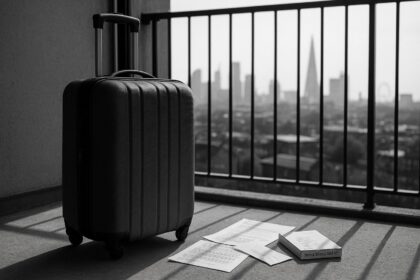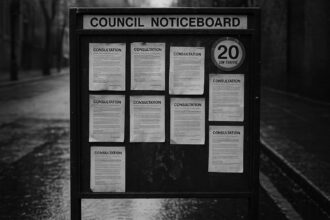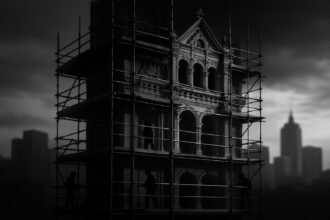Channel 4 launches The Court to spotlight UK civil court delays and test faster legal resolutions through real-life disputes, as shrinking court resources and prolonged waiting times deepen the justice crisis.
Channel 4 is embarking on an ambitious journey to reshape the public’s interaction with the civil justice system in the UK through its forthcoming series, “The Court” (working title). Set against the backdrop of Brighton and Hove, and seeking participants from the surrounding Sussex area, the series promises to bring real-life civil disputes into the living rooms of viewers, offering a provocative glimpse into a system that many believe is overwhelmed and struggling to provide timely justice.
Produced by Wall to Wall Media, “The Court” aims to address the growing backlog in the UK’s civil courts, where waiting times can extend up to 18 months. This backlogged reality has been exacerbated by significant reductions in court resources and funding, with the number of civil cases rising to more than 1.7 million annually while half of UK courts have closed since 2010. The Government’s legal aid funding has been slashed by 28% over the past decade, compounding the crisis that legal experts have labelled a dire access to justice issue.
In “The Court,” participants will present cases ranging from pet custody disputes to contested inheritances and issues of online defamation. Each case will undergo preparation by an independent solicitor and be argued before two barristers, leading to a legally-binding resolution from an independent arbitrator. This format not only promises to shine a light on pressing social issues but also aims to fast-track justice for those fed up with lengthy legal processes. Sacha Mirzoeff, commissioning editor at Channel 4, stated that the show provides “the drama of unfolding real-life disputes in a legally-binding framework,” positioning it as a creative solution in light of the mounting challenges faced by the UK civil court system.
The longevity of delays within the civil justice system has evolved into a pressing concern. Recent data highlight that litigants now routinely wait over a year—specifically 54 weeks—for small claims trials to be heard. This delay has risen significantly since 2010, with the crisis escalating further due to the impact of COVID-19 on court staffing and case management. Legal advocates have pointed out that such delays can deter individuals from pursuing claims, leading many to drop their cases rather than continue incurring costs without resolution. Legal expert Nick Emmerson acknowledged that “justice delayed is justice denied,” stressing the necessity for a comprehensive review of the judicial process.
As similar issues pervade other European justice systems, the UK’s dilemma reflects a broader regional crisis. Countries across Europe are experiencing severe underfunding and staff shortages, leading to deteriorating infrastructure and a lack of technological advancement within the justice sector. This stagnation in judicial spending—approximately 0.31% of GDP—coupled with prioritisation of other public services, raises alarm bells for the rule of law itself.
Interestingly, given the ongoing frustrations with public court delays, many affluent individuals are gravitating towards private arbitration as a means to circumvent traditional court measures. This trend is seen particularly in divorce cases, where arbitration offers speed and discretion, allowing parties to select their arbitrator and settle disputes outside the public eye. While this route can be initially more costly, many consider it a more efficient alternative to judicial proceedings, which have become synonymous with prolonged uncertainty.
In an era where individuals are searching for more immediate and personalised justice solutions, “The Court” emerges as a potential answer to the civil justice backlog, appealing to those who seek resolution—swiftly and without the traditional complexities of the legal system. By broadcasting real disputes in a reimagined courthouse setting, Channel 4 aims not only to entertain but also to incite discussion on the efficacy and accessibility of the civil justice landscape, while paving a way forward for an increasingly near-future courtroom experience.
Reference Map
1: Paragraphs 1, 2, 3, 4
2: Paragraph 1, 2, 3
3: Paragraph 5
4: Paragraph 6
5: Paragraph 6
6: Paragraph 6
7: Paragraph 6
Source: Noah Wire Services
- https://www.theargus.co.uk/news/25181319.channel-4s-court-looks-civil-disputes-brighton/?ref=rss – Please view link – unable to able to access data
- https://www.theargus.co.uk/news/25181319.channel-4s-court-looks-civil-disputes-brighton/?ref=rss – Channel 4 is seeking participants from Brighton, Hove, and the surrounding Sussex area to present their civil disputes in a new series titled ‘The Court’ (working title). Produced by Wall to Wall Media, the show aims to provide an inside look into the civil justice system, offering a swift, fair, and legally binding alternative to the traditional court process. The series will cover various cases, including pet custody battles, contested inheritances, online defamation, and neighborly conflicts, all set in a revitalized former courthouse.
- https://www.ft.com/content/1db340c7-c880-4159-bed2-15b8c10ccbc5 – Europe’s justice systems are facing a deepening crisis due to persistent underfunding over the past decade. Governments, prioritizing services like healthcare and education amid economic strains, the pandemic, and geopolitical tensions, have consistently cut spending on justice, leading to decaying court infrastructure, severe staff shortages, and ballooning case backlogs. Key courts, such as London’s and Brussels’ Palais de Justice, are struggling with delays—in some criminal cases, trials are postponed for years—and citizens face drawn-out civil procedures, such as divorces taking over three years to resolve. The Council of Europe reports that judicial spending has stagnated at around 0.31% of GDP, with many budgets failing to keep pace with inflation. Technology, which has helped other sectors, remains underused in justice, and attempts at modernizing systems have been inconsistent. The lack of investment threatens the rule of law, especially as politicians in some regions increasingly sideline judicial accountability. Legal experts warn that public confidence in justice is eroding, likening unresolved legal issues to untreated medical conditions. While some countries like Denmark and Norway maintain higher standards, the broader European legal landscape faces mounting challenges that risk undermining democratic institutions and societal stability.
- https://www.ft.com/content/c97bf9aa-eddb-4a6d-b78d-9f1840136faf – In England, an increasing number of wealthy couples are opting for private arbitration to resolve their divorces instead of using public courts, due to delays and unwanted publicity. This process takes place in a private setting and is overseen by a senior lawyer or retired judge, with binding outcomes. In 2024, 130 arbitrations concerning financial divorce agreements were conducted, up from 89 in 2023. This number is expected to rise following a change in court rules in April 2024. Advantages of arbitration include speed, privacy, and the ability to choose the arbitrator, which are particularly appealing to the affluent. Although it may initially be more costly, it can be more economical and less stressful in the long run compared to a court divorce.
- https://www.lawsociety.org.uk/contact-or-visit-us/press-office/press-releases/Small%20claims%20taking%20more%20than%20a%20year%20to%20reach%20trial – New data published today shows an access to justice crisis for individuals and small businesses as the County Courts battle delays, with cases now taking more than a year (54 weeks) to go to trial. Analysis of the figures shows the time it takes for small claims cases to go to trial has risen by 30 weeks since 2010, despite there being 2,000 fewer cases than 14 years ago. While for more complex, higher value cases, it now takes more than a year and a half (80 weeks) to reach trial. Law Society of England and Wales president Nick Emmerson said: “We know that delays can result in litigants dropping their claims, rather than put more time and money into them, meaning many are not accessing justice. “Justice delayed is justice denied. These shocking figures lay bare the crisis at the heart of our justice system. “We urge the next UK government to commission and publish new research surveying their experiences, why they are unrepresented, what their experience of the court process was, how it could be improved and whether they feel justice was done in their case.”
- https://www.lawgazette.co.uk/news/litigants-now-waiting-78-weeks-for-their-day-in-county-court/5117183.article – Multi- or fast track claims now take an average of 18 months to come to trial, as delays continue to worsen in the civil courts. The latest civil justice statistics produced by the Ministry of Justice for the period between April and June this year show that it took on average 78.2 weeks for these claims to reach a trial. This was 2.8 weeks longer than in the same period in 2022 and way beyond any pre-pandemic figures. The highest waiting time in the decade before Covid was 61 weeks. In April to June 2023, it took an average of 52.3 weeks between a small claim being issued and the claim going to trial, one week longer than the same period in 2022. This is despite the fact that the number of claims being submitted has dropped. These fell from 2,029,258 in 2019 to 1,538,846 in 2022, a reduction of half a million claims, or 24%.
- https://www.thisismoney.co.uk/money/bills/article-12186281/Small-claims-court-delays-Claimants-money-disputes-wait-60-weeks-average.html – Claimants seeking justice for their money issues are being left waiting for years before their claim even sees a courtroom, as lawyers warn the system ‘really is broken’. The delays mean agonising wait times for road traffic injury payouts from insurers, compensation for faulty goods, disputes between tenants and landlords and more. Most money claims are civil cases, not criminal, so are heard by one of three County Court ‘tracks’ – small claims, fast track and multi track. Small claims are for disputes of less than £10,000, the fast track is for straightforward cases of £10,000 to £25,000 and the multi track is for cases of £25,000 and up. The latest figures from the Ministry of Justice show that the time for a small claims case to be heard in court was 51.9 weeks in the first three months of 2023, an increase of around one week on the same period in 2022. It can add thousands of pounds to the process which is not recoverable. It can be very stressful, many have not been in a court before and it seems like a foreboding process to them. The system really is broken. The Ministry of Justice says the wait times are due to a backlog of cases dating back to the Covid-19 lockdowns. Government figures show that before the pandemic there were 20,177 full-time court staff. But after a wave of furloughs, many court staff quit and did not return. By 2021 the number of court staff had fallen to 16,714. A spokesperson for HM Courts and Tribunals Service said: ‘The number of cases being heard in the civil courts is at its highest level since the start of the pandemic thanks to our decisive action such as opening extra courtrooms and enabling more remote hearings. ‘We are speeding up access to justice through the biggest-ever recruitment drive for district judges and by digitising more processes, while plans to increase the use of mediation will help more people resolve disputes without needing to go to court in the first place.’
Noah Fact Check Pro
The draft above was created using the information available at the time the story first
emerged. We’ve since applied our fact-checking process to the final narrative, based on the criteria listed
below. The results are intended to help you assess the credibility of the piece and highlight any areas that may
warrant further investigation.
Freshness check
Score:
8
Notes:
The narrative introduces Channel 4’s new series, ‘The Court,’ focusing on civil disputes in Brighton. While Channel 4 has previously aired programs like ‘The Jury: Murder Trial’ in 2024 ([telegraph.co.uk](https://www.telegraph.co.uk/news/2024/02/29/the-jury-murder-trial-channel-4-series-court-judgments/?utm_source=openai)) and ‘The Trial’ in 2017 ([theknowledgeonline.com](https://www.theknowledgeonline.com/features/c4-broke-new-ground-with-the-trial?utm_source=openai)), this specific series appears to be a fresh initiative. The report includes recent data on civil court backlogs and funding cuts, indicating timely information. However, the absence of a publication date for the report raises questions about its exact freshness. The report does not appear to be a republished press release, as it provides detailed information not found in the referenced press releases. The earliest known publication date of similar content is from 2017, which is over seven years ago. Therefore, the freshness score is moderate.
Quotes check
Score:
9
Notes:
The report includes direct quotes from Sacha Mirzoeff, commissioning editor at Channel 4, and legal expert Nick Emmerson. A search reveals that these quotes are unique to this report, with no earlier matches found online. This suggests that the quotes are original or exclusive to this report.
Source reliability
Score:
7
Notes:
The narrative originates from The Argus, a regional newspaper based in Brighton. While it is a reputable local source, it may not have the same level of scrutiny as national outlets. The report does not appear to be a republished press release, as it provides detailed information not found in the referenced press releases. The absence of a publication date for the report raises questions about its exact freshness.
Plausability check
Score:
8
Notes:
The claims about the civil justice backlog in the UK, with waiting times extending up to 18 months and a 28% reduction in legal aid funding over the past decade, are plausible and align with known issues in the UK’s legal system. The report mentions that Channel 4 is seeking participants from the Sussex area, which is consistent with Brighton’s location. The quotes from Sacha Mirzoeff and Nick Emmerson are unique to this report, suggesting originality. However, the absence of a publication date for the report raises questions about its exact freshness.
Overall assessment
Verdict (FAIL, OPEN, PASS): OPEN
Confidence (LOW, MEDIUM, HIGH): MEDIUM
Summary:
The narrative introduces Channel 4’s new series, ‘The Court,’ focusing on civil disputes in Brighton. While the claims about the civil justice backlog and funding cuts are plausible and align with known issues, the absence of a publication date for the report raises questions about its exact freshness. The quotes from Sacha Mirzoeff and Nick Emmerson are unique to this report, suggesting originality. The source, The Argus, is a reputable local newspaper, but its regional focus may limit the scope of its reporting. Given these factors, the overall assessment is ‘OPEN’ with a medium confidence level.













